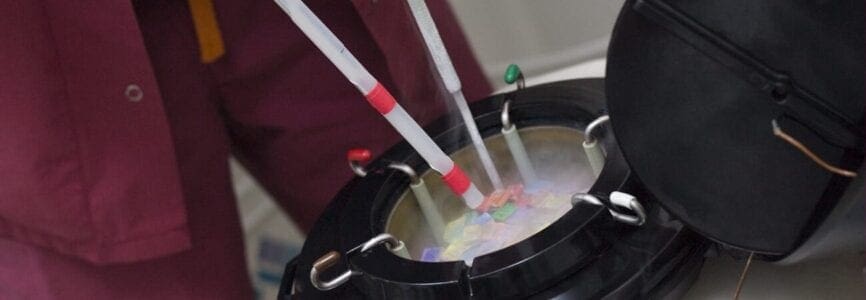Bioethics Forum Essay
Surprising Surge of Egg Freezing during the Pandemic Raises Ethical Questions
In the midst of the pandemic, life has been put on hold in a multitude of ways. Many women are taking a literal approach and electing to freeze their eggs with a process known as oocyte cryopreservation (OCP). Contrary to the expectations of many fertility clinics, OCP has increased sharply in 2020, reports Time. What was supposed to be a bust for the fertility industry has become a boom. As clinics grapple with this unexpected surge, pre-pandemic concerns about a lack of information on risks, benefits, and harms of OCP have persisted and are likely being exacerbated amidst the Covid-19 pandemic.
Prior to 2020, interest in egg freezing had already been increasing at a rapid rate. According to a study published in 2017 by the Society for Assisted Reproductive Technology, banking and freezing of eggs increased by 24% between 2016 and 2017. Each year, more women participate in the expensive process of OCP, with costs ranging from $6,000 to $20,000 per cycle, and additional yearly storage fees of $500 to $600. As popularity has risen, ethicists have voiced concerns about the lack of regulation and the marketing tactics employed by these centers.
The young assisted reproductive technology industry is undergoing massive growth. It was worth more than $21 billion in 2019 and is slated to more than double to over $50 billion by 2027. However, this success comes with risk. Bioethicists warn that the sudden explosion of companies offering egg freezing hides that many clinics offering these services lack experience or expertise with egg freezing.
OCP clinics are routinely found to lack proper explanations of the process, accurate success rates, or sources to support claims. One 2017 content analysis study found that many fertility clinics advertise the service persuasively, instead of informatively, emphasizing “indirect benefits while minimizing risks and the low chance of successfully bringing a child to term.” Another study found OCP advertisements from eight leading commercial egg-freezing companies contained language and claims that “could be considered unethical, misleading, deceptive, and/or unfair.” It is a confusing and challenging task for interested parties to sort through and obtain reliable information necessary for making well-informed choices about whether to freeze their eggs.
There is no question that advancements in reproductive technologies have empowered many women and bolstered their self-determination and autonomy. However, while egg freezing has in some ways helped relieve biological pressures, women’s autonomy in choosing to freeze or not to freeze can be restricted when economic factors like job stability come into play.
As the economic downturn from the pandemic continues to disproportionately affect women, there may be additional pressure for women to postpone pregnancy and opt for egg freezing procedures. Last September alone, over 800,000 women dropped out of the labor force compared to roughly 216,000 men, a disparity largely attributed to the added burdens of motherhood.
OCP may do less to widen options for career-minded women than it seems. When faced with the prospect of a tightening belt, it is not unreasonable to expect that companies may look more favorably upon female employees who elect to freeze their eggs. Some critics have noted that, rather than giving women more freedom in family planning, companies that cover or subsidize the service actually push employees into an uncomfortable double-bind where they can either choose egg freezing or take time off to raise children and suffer career consequences.
Federal law prohibits discrimination on the basis of race, gender, national origin, religion, disability, or age. Under the Pregnancy Discrimination Act of 1978, an amendment to the Civil Rights Act of 1964, the terms “because of sex” or “on the basis of sex” include (but are not limited to) “on the basis of pregnancy, childbirth, or related medical conditions.” But despite regulations prohibiting employer discrimination on the basis of pregnancy, such discrimination remains a widespread problem across all regions and industries in the United States. Even sectors dominated by women experience high rates of pregnancy discrimination. For example, health care and educational services accounted for 28% of all pregnancy discrimination reports filed with the U.S. Equal Employment Opportunity Commission from 2011 to 2015. Furthermore, while all women experience pregnancy discrimination, it is important to note that Black women are disproportionately affected.
As women bear the brunt of worsened job prospects in the midst of the pandemic and OCP continues to be a source of ethical tension, we need to work towards ensuring that emerging fertility technologies encourage reproductive freedom, rather than constrict it. Before that is possible, regulations for workplace discrimination must be revamped so enforcement is possible. Egg freezing can help women have more freedom in family planning, but employers must ensure that they also offer flexible work environments to help support women who do not choose to freeze their eggs and do not want to postpone pregnancy.
Women interested in OCP can face unethical advertising, pressures from employers, and deceptive misinformation from providers. OCP has the ability to either support or restrict the autonomy of women. Rigorous bioethical inquiry and policy that learns from previous shortcomings in protecting women’s choice in the workplace will be necessary to handle the exploding uptake of OCP in the wake of the pandemic. As women face formidable difficulties balancing work and family in the midst of the Covid-19 pandemic, attention must be paid to how egg freezing will be used by employers and whether the option inhibits autonomy or helps further reproductive justice efforts.
Danielle Pacia, MBE, is a project manager and research assistant at The Hastings Center, @DaniellePacia. Jacob Howard is a health information specialist at the Healthy Island Project.













You left out a significant aspect possibly contributing to increased egg freezing during Covid vaccination rollout.